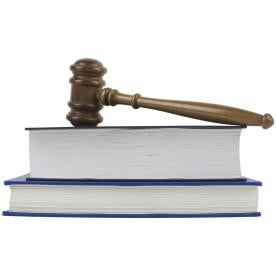Expert Testifies in First Terror Trial to Target Bank
A former Israeli intelligence officer, appearing as an expert witness, took the stand this month in a Brooklyn civil trial over a bank’s alleged support of terrorism.
Arieh Spitzen testified that Arab Bank Plc helped finance two dozen terrorist attacks conducted by the militant Palestinian group Hamas and compensated the families of numerous suicide bombers. The plaintiffs in Linde v. Arab Bank Plc are comprised of several hundred Americans who were either victims of the terror attacks or family members of those who were killed overseas in the early 2000s.
The suit is the first of its kind to sue a bank for violating the U.S. Anti-Terrorism Act, alleging that the bank basically had a “death and dismemberment benefit plan” for Hamas’ martyrs. The case is ongoing, with the bank expected to call over 20 witnesses, including its chairman.
Unforeseeable Precedent Change Disqualified Expert Unfairly
When New Jersey’s top court ruled that experts in medical-malpractice cases against doctors must specialize in the same specialty as the defendants, some litigants found their own personal injury cases affected before they were resolved.
In these pending actions, the litigant should have a chance to cure their deficiency and find a new expert, the Appellate Division ruled this month.
In the case of Williams v. Atlanticare Regional Medical Center, the plaintiff had sued a hospital and two doctors who had mistakenly cut through plaintiff’s pharynx while performing spinal surgery on her for injuries suffered after an automobile accident. While both doctors claimed to be specialists in spinal surgery, one doctor was board-certified in orthopedic surgery, and one doctor was board-certified in neurological surgery.
The plaintiff proffered as her expert a doctor who also specialized in spinal surgery and was board-certified in neurological surgery. This expert was acceptable under the old interpretation of the expert witness rules to be qualified to testify against both defendant doctors.
However, after the New Jersey Supreme Court handed down its decision in Nicholas v. Mynster, the plaintiff’s expert suddenly became unqualified to testify against the doctor whose board-certification differed from the expert’s.
Despite having case law changed on her while her case was pending, the Williams plaintiff was told by the court that she could not have the opportunity to find an additional expert to satisfy the new standard because the deadline to do so had passed.
It was this decision by the court that was ultimately reversed by the New Jersey appeals court, basically finding that the interest in fairness should allow the plaintiff to cure her unforeseeable and good faith failure. The defendant doctor’s summary judgment order was reversed, and the case was returned to the trial court.
Expert Atones for Daubert Deficiencies
An expert in the patent law case of Digital Reg of Texas, LLC v. Adobe Systems, Inc. was given a second chance this month to change his theories so that he could qualify himself as admissible.
U.S. District Chief Judge for the Northern District of California Claudia Wilken originally found plaintiff’s damages expert to be inadmissible. The chief judge ruled that the expert’s revenue royalty rate was improperly conceived and that calculated computer piracy figures were unreliable.
However, when the expert witness returned with a revised report, Judge Wilken found the expert to have sufficiently satisfied the Daubert standard of admissibility.
Adobe posed numerous arguments challenging the plaintiff’s expert, including the expert’s new royalty rate calculation and apportionment thereof. While the judge found some merit to Adobe’s claims, she ruled that its arguments went to the weight of the evidence and were thus appropriate for cross-examination instead.
Judge Bucks Expert Trend with ‘Market Efficiency’ Finding
Despite her colleague and her boss both being disqualified as experts in prior similar litigation, one securities expert found herself “qualified” by a U.S. federal judge to testify against a Chinese reverse-merger company.
U.S. District Judge for the Southern District of New York Victor Marrero denied defendants’Daubert motion to disqualify financial consultant Cynthia L. Jones from testifying as an expert on market efficiency based on what defendants claimed was Jones’ “lack of meaningful educational and practical expertise.”
In this case of McIntire v. China MediaExpress Holdings, Inc., Judge Marrero wrote that Jones’ credentials are extensive and cited 19 cases in which she was admitted as a securities law expert (2014 U.S. Dist. LEXIS 113446 (S.D.N.Y. Aug. 15, 2014)). Though she is not an established expert in “market efficiency,” Jones’ securities law expertise is sufficient, Marrero writes, ruling that the “law does not require a witness to have substantial academic training and accreditation in order to be qualified as an expert under Rule 702.”
Citing a case against eBay in his same Manhattan-based court, Marrero explains that “an expert may earn his or her expertise ‘through knowledge, skill, experience, training, or education’" Tiffany (NJ) Inc. v. eBay, Inc., 576 F. Supp. 2d 457, 458-59 (S.D.N.Y. 2007).
“The Court is persuaded that Jones' combination of experience, training, and education qualifies her as an expert in market efficiency,” Marrero writes.
The longtime senior judge also rejected defendants’ arguments that other financial experts – Michael Marek, who is Jones’ boss at Financial Markets Analysis, LLC; and Kenneth McGraw, with whom Jones had collaborated on expert work in the past – had both been rejected by the federal courts as experts in the field of “market efficiency.”
What do you think? Should a securities law expert be qualified in market efficiency? When rules or case law changes while cases are pending, should those cases be affected midstream? It’s your turn to weigh in. Send your thoughts on any of these cases.




 i
i


